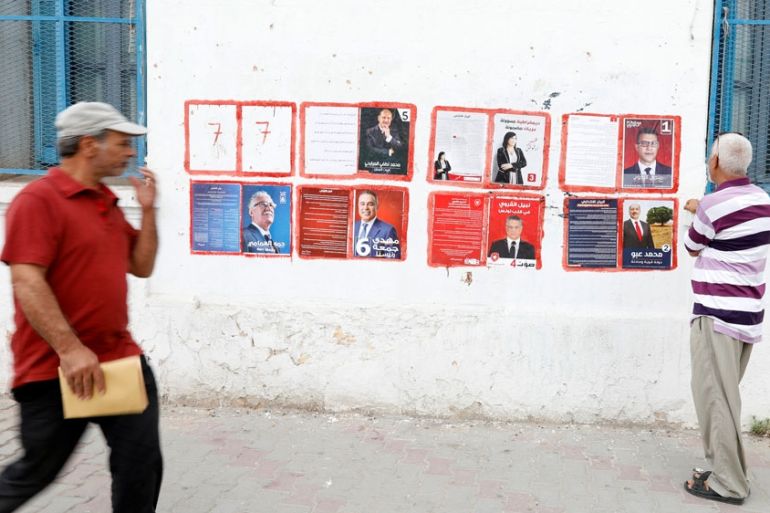Campaigning under way in Tunisia ahead of presidential vote
It’s unlikely any candidate will obtain a majority, meaning second round will likely be held in November.

Campaigning began in Tunisia on Monday for a September 15 presidential election seen as vital to defending democratic gains made after the Arab Spring revolution.
The vote – the second of its kind since the 2011 overthrow of longtime ruler Zine El Abidine Ben Ali – was brought forward from November following the death of President Beji Caid Essebsi in July.
Keep reading
list of 4 itemsBehind India’s Manipur conflict: A tale of drugs, armed groups and politics
Solomon Islands prepares for ‘most important election since independence’
Six takeaways from first day of Trump’s New York hush money criminal trial
The election will see the participation of some of the country’s biggest names in Tunisian politics.
Among the 26 candidates are Prime Minister Youssef Chahed, Defence Minister Abdelkarim Zbidi, interim parliamentary speaker and Ennahdha Party vice president Abdelfattah Mourou, as well as former President Moncef Marzouki.
The electoral commission on Saturday confirmed the participation of Nabil Karoui, a media mogul and owner of Nessma TV, who was arrested last month on tax fraud and money laundering charges.
Parliament passed a controversial law in June to prevent Karoui – which one polling agency put in the lead – from running for the presidency on account of his ownership of a television station that he allegedly used to promote his philanthropic work, giving him an advantage over other candidates.
Essebsi, however, refused to ratify the law before he died.
Supporters of Karoui and his Heart of Tunisia party accused Chahed of masterminding the arrest, saying the allegations against him date back to 2016 but had not been acted upon until recently because of the threat he poses to established parties.
Chahed categorically denied the accusations.
Security, economy top priorities
The beginning of election season on Monday coincided with the killing of three fighters in the town of Hidra, along the border with Algeria, highlighting the threat armed groups still pose to the country.
Attacks on a museum in the capital, Tunis, and a beach resort in the coastal city of Sousse in 2015 devastated the country’s vital tourism industry, with tourist arrivals dropping by 25 percent to 5.4 million that year.
That number is expected to surpass the nine million mark by the end of this year, Chahed recently told local media.
Unemployment constitutes another challenge for the contenders with the unemployment rate hovering above 15 percent – standing at more than 30 percent in some of the marginalised interior regions.
While the first free-and-fair elections were held in May 2018 to help remedy the power imbalance between the more industrialised coastal regions and others, little has been achieved.
Some candidates – including Zbidi, the defence minister, and Mohsen Marzouk, a former ally of Essebsi – have promised to empower the presidency further at the expense of parliament and municipal councils.
Analysts say it is unlikely any candidate will obtain a majority, meaning the second round of voting should take place in November, after October parliamentary elections.